DBT-ICT CENTRE FOR ENERGY BIOSCIENCES
ABOUT US:
The DBT-ICT Centre for Energy Biosciences (DBT-ICT-CEB) is a unique place that integrates basic and translational science capabilities for bioprocess development and scale up. Funded by the Department of Biotechnology, Ministry of Science and Technology, India, the Centre was established and formally inaugurated in May 2009. Established at a total cumulative cost equivalent to more than USD 15 million, the Centre is a part of the Institute of Chemical Technology (ICT) at Matunga, Mumbai, which is a deemed University under Section 3 of UGC Act 1956. The Centre was set up as a result of vision and efforts of Dr. M. K. Bhan, Secretary DBT and Dr. Renu Swarup, Advisor, DBT, and functions under the leadership of Dr. G. D. Yadav, Vice Chancellor, ICT. The projects and technical programs at the Centre are coordinated by Prof. Arvind Lali. The Centre is focused primarily at developing biotechnologies for deriving biofuels and other products from renewable resources for reducing India’s rising dependence on petroleum and cut down greenhouse gas emissions. The Centre believes in building multidisciplinary capacity for development of integrated technology packages.
The Centre successfully completed its first phase of five years in 2013 and was awarded an extension of five years by the Department of Biotechnology with the extended mandate of upscaling and upgrading the platform technologies developed during the first phase. The 10 Ton/day biomass pilot plant set up by Industry has successfully validated all segments of the novel DBT-ICT Lignocellulosic Ethanol Technology in a continuous non-stop flow mode from biomass size reduction to ethanol fermentation. The technology is at present being taken to commercial scales by different oil marketing companies. The Centre has developed a highly competent working groups in the area of Synthetic biology, Fermentation technology, Green/Chemical catalysis, Algal technologies, Enzyme engineering & technology, Separation technologies. These groups have developed a range of globally competitive cutting edge technologies that are at present being translated to demonstration and commercial scale plants.
With an outstanding achievement in the first phase, the second phase progressed to develop platform technologies for conversion of all domestic, industrial and agricultural wastes to renewable products (fuel, food, feed, material, energy and chemicals) using smart combinations of chemical and biological technologies. Also during the second phase, the Centre has developed an integrated biorefinery concept through multi-product processing using chemical or biological routes that are being taken up for technology transfer or scaleup. The Centre has expanded its state-of-art facility and procured several high-end equipment’s and instruments that not only leads to high level contemporary research but also an accelerated development of several more scalable technologies based on the knowledge base generated. The Centre having completed its second phase in 2018, aims to continue the work in an intensive mission mode for innovative research and translation of developed technologies.
The Centre for Energy Biosciences has attracted a large number of industrial and academic collaborations as a result of its reputation of conducting cutting edge research and delivering viable and scalable solutions to the biotech industry. The Centre is also part of several national and international academic collaborations (Indo-UK, Indo-Australia, Indo-German, Indo-US and several national projects) with grants amounting to more than 10 million USD under various R&D schemes floated by Ministry of Science and Technology, Government of India. The technologies developed at the DBT-ICT Centre have been secured through patent filings across the world. A number of technologies have been already licensed to industries for pilot and commercial scale plants.
AIMS:
Envisage the end goals as clearly as possible at all times Put all multiple disciplines to work in close co-ordination Combine expertise at two ends of the spectrum i.e. molecular biology and engineering sciences Scale up and apply evolving principles/ideas progressively alongside development in order to make sure that efforts are time efficient and not wasted and the technology zeroes to viability at a faster rate
RESEARCH GROUPS
GREEN/CHEMICAL CATALYSIS
Objectives
Developing second and next generation sustainable biofuel technologies
Development of biorefinery concept through multiproduct processing
Scaling up and implementing biofuel plants in decentralized manner
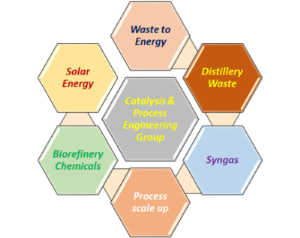
Approaches
Innovative pre-treatment strategies
Radical intensification for enzyme process
Intensification of fermentation steps
Achievements
Technology developed for pre-treatment of low & high lignin biomass
Production of separate enzyme amenable cellulose and hemicellulose fractions along with lignin
Novel two step continuous enzyme process with rapid reaction rates and reduction in enzyme dosage and reaction time
More than 90 % yield of sugars from biomass
High ethanol tolerant strains for C5 & C6 fermentation
High cell density column fermenters
More than 90 % theoretical yield
Low cost Pervaporation & distillation system
Technology Highlights
Continuous process throughout; low CAPEX & low plant footprint
Biomass to ethanol in less than 24 hours
Ethanol yield > 300 L/Ton biomass
Technology components patent protected worldwide
IGL Pilot plant operational from April 2012 and first phase commissioned successfully
ENZYME TECHNOLOGIES
Objectives
- To develop viable processes for microbial/enzyme catalyzed bio-transformations
- Develop stable immobilized biocatalyst preparations
- Production and cost effective purification of expressed biocatalyst
- Bioreactor designs for process scale-up
- Engineer/develop specific enzymes with desired activity profiles
- Develop suitable over-expression systems for selected biocatalysts
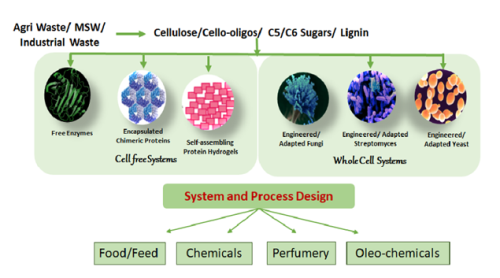
Approaches
In silico biocatalyst structure-function relationship studies
Reaction/ Biocatalyst engineering
Integration of processes
Process scale up
Reactor engineering
FERMENTATION TECHNOLOGIES
Objectives
Identifying and designing microorganisms
Lab scale optimization and production
Large scale production
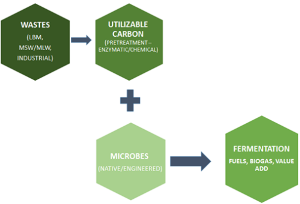
Approaches
Modification of growth phases
Media engineering
Fermenter design
Extractive fermentation
ALGAL BIOTECHNOLOGIES
Objectives
Explore algae as a source of biofuel feedstock/biodiesel/value added products Develop knowledge, technology and process strategies for sustainable production of algae as feedstock for fuel & chemicals Photo bioreactor/Raceway pond designing for efficient scale up of algae as biofuel feedstock
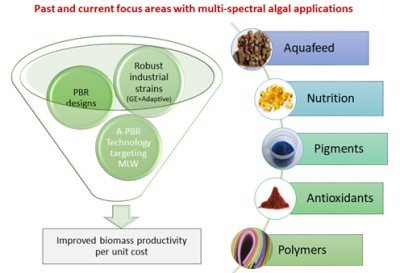
Approaches
Screening & selection of algae
Growth and media engineering, consortia design, CO2 mitigation
Strain improvement by genetic modification/metabolic engineering/hybridization
Photo bioreactor/Raceway pond designing
Harvesting and processing
SYNTHETIC BIOLOGY
Objectives
Designing microbes/algae/cyanobacteria for synthesis of drop in biofuels (butanol, biodiesel, biohydrocarbons) and high value products (proteins, lipids, alcohol, organic acids, carotenoids) Large scale bioproduction of amino acids Synthesis of furanics from biomass
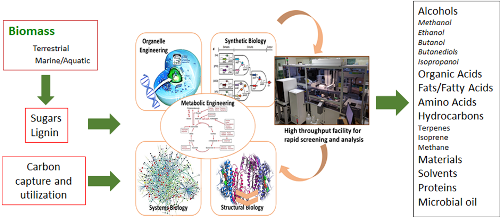
Approaches
Pathway analysis for redirecting fluxes towards biofuel production
Construction of synthetic metabolic pathways for production of high value compounds
Vector construction for shuttle/transient/integrative cloning and expression of genes
Recombinational methods for over expression /silencing of genes
Alleviating product toxicity in biofuel production by directed evolution for tolerant strains
SEPARATION TECHNOLOGIES
Objectives
Thermodynamic and hydrodynamic characterization of various adsorbents for RPC, NPC, HIC, HCIC, IEX, Affinity, IMAC, SEC & mixed mode chromatography Design & development of separations of bio-based, natural, synthetic & semi synthetic products using adsorptive & chromatographic separation To improve the product purity, productivity and process economics (commercial viability) through designing of selectivity and process engineering Designing of membrane (UF, MF and NF) and extractive separation, crystallization and precipitation (use of smart polymers and poly/electrolytes) and to explore their possible integration with chromatographic separation Mechanistic and empirical models for adsorption and separation mechanisms Process monitoring through process optimization and product characterization Designing, engineering and scale up of chromatographic reactors (Packed bed, EBA, FBA, SMB, FMB, Segmented), skids as well as pilot and production plants
Approaches
High Throughput Process Development (HTPD)
Selectivity Engineering
Process Integration and intensification
Quality by Design (QbD)
Reactor design and engineering
PAT (Process Analytical Technology) and controls
Design of adsorbents and affinity ligands
Process and product characterization, Validation and risk analysis
Computational fluid dynamics
IP MANAGEMENT TECHNOLOGY AND COMMERCIALIZATION UNIT
Objectives
Capacity building within the centre in IP Management
IP protection to technologies generated at the centre
IP Management with regards to technology transfer and licensing
Approaches
Filing of Indian, PCT’s, and foreign patents
Spreading awareness on IP issues
Preparing MOUs, CDAs/NDAs and MTAs